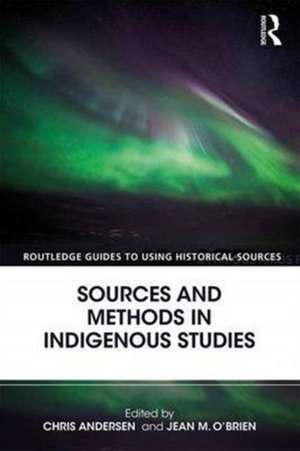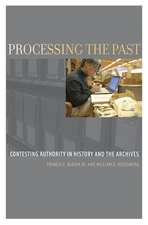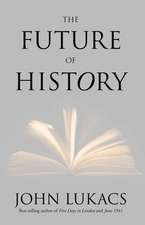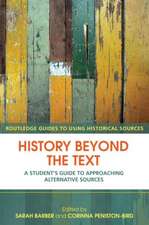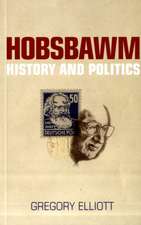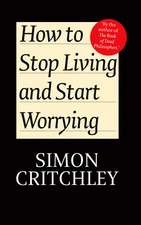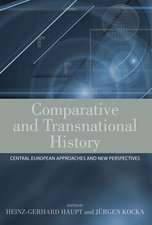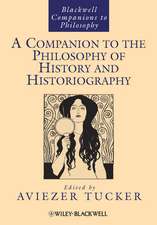Sources and Methods in Indigenous Studies: Routledge Guides to Using Historical Sources
Editat de Chris Andersen, Jean M. O'Brienen Limba Engleză Paperback – 9 dec 2016
The book has a two-part structure that looks, firstly, at the theoretical and disciplinary movement of Indigenous Studies within history, literature, anthropology, and the social sciences. Chapters in this section reveal that, while engaging with other disciplines, Indigenous Studies has forged its own intellectual path by borrowing and innovating from other fields. In part two, the book examines the many different areas with which sources for indigenous history have been engaged, including the importance of family, gender, feminism, and sexuality, as well as various elements of expressive culture such as material culture, literature, and museums. Together, the chapters offer readers an overview of the dynamic state of the field in Indigenous Studies.
This book shines a spotlight on the ways in which scholarship is transforming Indigenous Studies in methodologically innovative and exciting ways, and will be essential reading for students and scholars in the field.
| Toate formatele și edițiile | Preț | Express |
|---|---|---|
| Paperback (1) | 390.37 lei 6-8 săpt. | |
| Taylor & Francis – 9 dec 2016 | 390.37 lei 6-8 săpt. | |
| Hardback (1) | 1059.45 lei 6-8 săpt. | |
| Taylor & Francis – 9 dec 2016 | 1059.45 lei 6-8 săpt. |
Din seria Routledge Guides to Using Historical Sources
-
 Preț: 311.91 lei
Preț: 311.91 lei -
 Preț: 311.41 lei
Preț: 311.41 lei -
 Preț: 281.20 lei
Preț: 281.20 lei -
 Preț: 288.56 lei
Preț: 288.56 lei -
 Preț: 280.47 lei
Preț: 280.47 lei -
 Preț: 281.99 lei
Preț: 281.99 lei -
 Preț: 304.80 lei
Preț: 304.80 lei -
 Preț: 295.63 lei
Preț: 295.63 lei -
 Preț: 398.57 lei
Preț: 398.57 lei -
 Preț: 365.87 lei
Preț: 365.87 lei - 17%
 Preț: 238.40 lei
Preț: 238.40 lei -
 Preț: 289.73 lei
Preț: 289.73 lei -
 Preț: 348.97 lei
Preț: 348.97 lei -
 Preț: 349.80 lei
Preț: 349.80 lei -
 Preț: 349.53 lei
Preț: 349.53 lei -
 Preț: 288.19 lei
Preț: 288.19 lei -
 Preț: 349.85 lei
Preț: 349.85 lei
Preț: 390.37 lei
Nou
Puncte Express: 586
Preț estimativ în valută:
74.70€ • 77.99$ • 61.82£
74.70€ • 77.99$ • 61.82£
Carte tipărită la comandă
Livrare economică 04-18 aprilie
Preluare comenzi: 021 569.72.76
Specificații
ISBN-13: 9781138823617
ISBN-10: 1138823619
Pagini: 328
Dimensiuni: 156 x 234 x 18 mm
Greutate: 0.48 kg
Ediția:1
Editura: Taylor & Francis
Colecția Routledge
Seria Routledge Guides to Using Historical Sources
Locul publicării:Oxford, United Kingdom
ISBN-10: 1138823619
Pagini: 328
Dimensiuni: 156 x 234 x 18 mm
Greutate: 0.48 kg
Ediția:1
Editura: Taylor & Francis
Colecția Routledge
Seria Routledge Guides to Using Historical Sources
Locul publicării:Oxford, United Kingdom
Public țintă
PostgraduateCuprins
Notes on Contributors
Introduction
Chris Andersen and Jean M. O’Brien
PART ONE: EMERGING FROM THE PAST
Chapter One: Historical Sources and Methods in Indigenous Studies: Touching on the Past, Looking to the Future
Jean M. O’Brien
Chapter Two: Literary Reflections on Indigenous Literary Nationalism: On Home Grounds, Singing Hogs, and Cranky Critics
Daniel Heath Justice
Chapter Three: History, Anthropology, Indigenous Studies
Pauline Turner Strong
Chapter Four: Reclaiming the Statistical "Native": Quantitative Historical Research Beyond the Pale
Chris Andersen and Tahu Kukutai
PART TWO: ALTERNATIVE SOURCES AND METHODOLOGICAL REORIENTATIONS
I. Reframing Indigenous Studies
Chapter Five: Recovering, Restorying, and Returning Nahua Writing in Mexico
Kelly McDonough
Chapter Six: Mind, Heart, Hands: Thinking, Feeling, and Doing in Indigenous History Methodology
K. Tsianina Lomawaima
Chapter Seven: Relationality: A Key Presupposition of an Indigenous Social Research Paradigm
Aileen Moreton-Robinson
Chapter Eight: Standing With and Speaking as Faith: A Feminist-Indigenous Approach to Inquiry
Kim TallBear
Chapter Nine: Stepping In It: How to Smell the Fullness of Indigenous Histories
Vicente Diaz
Chapter Ten: Intellectual History and Indigenous Methodology
Robert Warrior
Chapter Eleven: A Genealogy of Critical Hawaiian Studies, Late 20th to
21st Century
Noenoe K. Silva
Chapter Twelve: Placing the City: Crafting Urban Indigenous Histories
Coll Thrush
II. All in the Family
Chapter Thirteen: "I do still have a letter:" Our Sea of Archives"
Alice Te Punga Somerville
Chapter Fourteen: History with Nana: Family, Life, and the Spoken Source
Aroha Harris
Chapter Fifteen: Elder Brother as Theoretical Framework
Robert Innes
Chapter Sixteen: Histories with Communities: Struggles, Collaborations, Transformations
Amy E. Den Ouden
Chapter Seventeen: Places and Peoples: Sámi Feminist Technoscience and Supradisciplinary Research Methods
May-Britt Ohman, Uppsala University
Chapter Eighteen: Oral History
William Bauer, Jr.
III. Feminism, Gender, and Sexuality
Chapter Nineteen: Status, Sustainability, and American Indian Women in the Twentieth Century
Jacki Thompson Rand
Chapter Twenty: Representations of Violence: (Re)Telling Indigenous Women’s Stories and the Politics of Knowledge Production
Shannon Speed
Chapter Twenty-One: Feminism and History, Sources and Methods in Indigenous History
Mishuana Goeman
Chapter Twenty-Two: History and Masculinity
Brendan Hokowhitu
Chapter Twenty-Three: Indigenous is to Queer as . . . : Queer questions for Indigenous Studies
Mark Rifkin
IV. Indigenous Literature and Expressive Culture
Chapter Twenty-Four: State Violence, History, and Maya Literature in Guatemala
Emilio de valle Escalante
Chapter Twenty-Five: Pieces Left Along the Trail: Material Culture Histories and Indigenous Studies
Sherry Farrell Racette, in conversation with Alan Corbiere and Crystal Migwans
Chapter Twenty-Six: Authoring Indigenous Studies in Three Dimensions: An Approach to Museum Curation
Gabrielle Tayac
Chapter Twenty-Seven: Future Tense: Indigenous Film, Pedagogy, Promise
Michelle Raheja
V. Indigenous Peoples In and Beyond the State
Chapter Twenty-Eight: Stories as Law: A Method to Live by
Heidi Kiiwetinepinesiik Stark
Chapter Twenty-Nine: Metis in the Borderlands of the Northern Plains in the Nineteenth Century
Brenda Macdougall and Nicole St-Onge
Chapter Thirty: Plotting Colonization and Recentering Indigenous Actors: Approaches to and Sources for Studying the History of Indigenous Education
Margaret D. Jacobs
Chapter Thirty-One: Laws, Codes, and Informal Practices: Building Ethical Procedures for Historical Research with Indigenous Medical Records
Mary Jane Logan McCallum
Chapter Thirty-Two: Toward a Post-Quincentennial Approach to the Study of Genocide
Jeffrey Ostler
Chapter Thirty-Three: Revealing, Reporting, and Reflecting: Indigenous Studies Research as Praxis in Reconciliation Projects
Sheryl Lightfoot
Introduction
Chris Andersen and Jean M. O’Brien
PART ONE: EMERGING FROM THE PAST
Chapter One: Historical Sources and Methods in Indigenous Studies: Touching on the Past, Looking to the Future
Jean M. O’Brien
Chapter Two: Literary Reflections on Indigenous Literary Nationalism: On Home Grounds, Singing Hogs, and Cranky Critics
Daniel Heath Justice
Chapter Three: History, Anthropology, Indigenous Studies
Pauline Turner Strong
Chapter Four: Reclaiming the Statistical "Native": Quantitative Historical Research Beyond the Pale
Chris Andersen and Tahu Kukutai
PART TWO: ALTERNATIVE SOURCES AND METHODOLOGICAL REORIENTATIONS
I. Reframing Indigenous Studies
Chapter Five: Recovering, Restorying, and Returning Nahua Writing in Mexico
Kelly McDonough
Chapter Six: Mind, Heart, Hands: Thinking, Feeling, and Doing in Indigenous History Methodology
K. Tsianina Lomawaima
Chapter Seven: Relationality: A Key Presupposition of an Indigenous Social Research Paradigm
Aileen Moreton-Robinson
Chapter Eight: Standing With and Speaking as Faith: A Feminist-Indigenous Approach to Inquiry
Kim TallBear
Chapter Nine: Stepping In It: How to Smell the Fullness of Indigenous Histories
Vicente Diaz
Chapter Ten: Intellectual History and Indigenous Methodology
Robert Warrior
Chapter Eleven: A Genealogy of Critical Hawaiian Studies, Late 20th to
21st Century
Noenoe K. Silva
Chapter Twelve: Placing the City: Crafting Urban Indigenous Histories
Coll Thrush
II. All in the Family
Chapter Thirteen: "I do still have a letter:" Our Sea of Archives"
Alice Te Punga Somerville
Chapter Fourteen: History with Nana: Family, Life, and the Spoken Source
Aroha Harris
Chapter Fifteen: Elder Brother as Theoretical Framework
Robert Innes
Chapter Sixteen: Histories with Communities: Struggles, Collaborations, Transformations
Amy E. Den Ouden
Chapter Seventeen: Places and Peoples: Sámi Feminist Technoscience and Supradisciplinary Research Methods
May-Britt Ohman, Uppsala University
Chapter Eighteen: Oral History
William Bauer, Jr.
III. Feminism, Gender, and Sexuality
Chapter Nineteen: Status, Sustainability, and American Indian Women in the Twentieth Century
Jacki Thompson Rand
Chapter Twenty: Representations of Violence: (Re)Telling Indigenous Women’s Stories and the Politics of Knowledge Production
Shannon Speed
Chapter Twenty-One: Feminism and History, Sources and Methods in Indigenous History
Mishuana Goeman
Chapter Twenty-Two: History and Masculinity
Brendan Hokowhitu
Chapter Twenty-Three: Indigenous is to Queer as . . . : Queer questions for Indigenous Studies
Mark Rifkin
IV. Indigenous Literature and Expressive Culture
Chapter Twenty-Four: State Violence, History, and Maya Literature in Guatemala
Emilio de valle Escalante
Chapter Twenty-Five: Pieces Left Along the Trail: Material Culture Histories and Indigenous Studies
Sherry Farrell Racette, in conversation with Alan Corbiere and Crystal Migwans
Chapter Twenty-Six: Authoring Indigenous Studies in Three Dimensions: An Approach to Museum Curation
Gabrielle Tayac
Chapter Twenty-Seven: Future Tense: Indigenous Film, Pedagogy, Promise
Michelle Raheja
V. Indigenous Peoples In and Beyond the State
Chapter Twenty-Eight: Stories as Law: A Method to Live by
Heidi Kiiwetinepinesiik Stark
Chapter Twenty-Nine: Metis in the Borderlands of the Northern Plains in the Nineteenth Century
Brenda Macdougall and Nicole St-Onge
Chapter Thirty: Plotting Colonization and Recentering Indigenous Actors: Approaches to and Sources for Studying the History of Indigenous Education
Margaret D. Jacobs
Chapter Thirty-One: Laws, Codes, and Informal Practices: Building Ethical Procedures for Historical Research with Indigenous Medical Records
Mary Jane Logan McCallum
Chapter Thirty-Two: Toward a Post-Quincentennial Approach to the Study of Genocide
Jeffrey Ostler
Chapter Thirty-Three: Revealing, Reporting, and Reflecting: Indigenous Studies Research as Praxis in Reconciliation Projects
Sheryl Lightfoot
Notă biografică
Chris Andersen (Michif) is Professor and Interim Dean of the Faculty of Native Studies at the University of Alberta. He is the author of "Métis": Race, Recognition and the Struggle for Indigenous Peoplehood (2014).
Jean O’Brien (White Earth Ojibwe) is Distinguished McKnight University Professor of History at the University of Minnesota. She has authored five books, including Firsting and Lasting: Writing Indians Out of Existence in New England (2010).
Jean O’Brien (White Earth Ojibwe) is Distinguished McKnight University Professor of History at the University of Minnesota. She has authored five books, including Firsting and Lasting: Writing Indians Out of Existence in New England (2010).
Recenzii
"This book is a valuable collection of essays for anyone teaching or researching any aspect of Indigenous studies. It is an especially useful tool for young scholars who intend to work with indigenous communities, no matter what discipline they represent."
Dawn Marsh, Purdue University, USA
Dawn Marsh, Purdue University, USA
Descriere
Sources and Methods in Indigenous Studies is a synthesis of changes and innovations in methodologies in indigenous studies, focusing on sources over a broad chronological and geographical range. Written by a group of highly respected Indigenous Studies scholars from across an array of disciplines, this collection offers insight into the methodological approaches contributors take to research, and how these methods have developed in recent years. This book shines a spotlight on the ways in which scholarship is transforming Indigenous Studies in methodologically innovative and exciting ways, and will be essential reading for students and scholars in the field.
